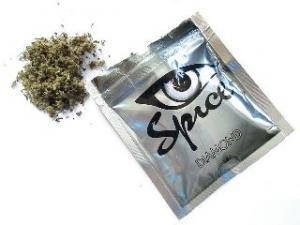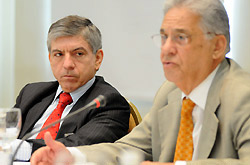The DEA's federal emergency ban on synthetic cannabinoids may be stalled, but bills are moving in a half-dozen states. Retailers are beginning to organize to fight back.
In a bid to repress the home manufacture of methamphetamine, a number of states are moving to require prescriptions for over-the-counter cold and allergy medications containing psuedoephedrine. Cold sufferers, take heed!
Can the Border Patrol fire an agent for saying he supports drug legalization? The federal courts will decide.
We present two weeks worth of Mexican drug war mayhem, and we review the death toll year by year since Calderon sent in the troops in 2007. The total has passed 35,000.
An Illinois sheriff goes down hard, a Massachusetts police chief parties too hard, a Massachusetts cop gets nailed for helping out his local pot dealer, and a Florida motorcycle cop gets caught stealing a bud in his helmet.
DrugWarFacts.org is an in-depth compilation of key facts, stats and quotes on the full range of drug policy issues, excerpted from expert publications. The Chronicle is running a series of info items from DrugWarFacts.org, and we encourage you to check it out.
Some global heavyweights have taken on the international drug control system and how to come up with a better one.
Prince Georges County, Maryland, cops messed with the wrong guy when their SWAT team hit the home of the mayor of Berwyn Heights and killed his dogs in a botched drug raid. Now they have to change their ways.
A leading advocacy group for pain patients has essentially been driven out of business by a federal prosecutor and the federal courts. The Pain Relief Network will be missed.
The fight over medical marijuana in Montana has moved to the state house, some trying to repeal it but most debating what are the best regulations.
Which state on which coast will be the first to legalize marijuana? There are now bills filed in Massachusetts and Washington.
Add Virginia to the list of states where imposing drug testing on recipients of public assistance is on the legislative agenda.
Events and quotes of note from this week's drug policy events of years past.
Although the DEA's bid to ban synthetic cannabinoids at the federal level has been stymied, at least temporarily, bills to ban it at the state level are moving through legislatures in at least a half-dozen states and more will probably follow this year. They are already banned in a dozen other states. But retailers' representatives say that "fake pot" is a multi-billion dollar a year industry that should be regulated, not prohibited.

synthetic marijuana -- gone in some states, going in others? (image via Wikimedia)
In products going under a variety of brand names, such as Spice and K2, and sold widely in head shops, convenience stores, and gas stations, as well as via the Internet, synthetic cannabinoids are sprayed onto dried plant matter. Although the products are marketed as incense and sometimes marked "not for human consumption," they are typically smoked by purchasers in a bid to replicate a marijuana high with a legal substance.
While advocates of banning the synthetic cannabinoids describe them as harmful and dangerous, there is little evidence they are addictive or especially toxic. There are no known overdose fatalities from Spice, although at least one suicide has been linked by grieving parents to recent use. Other
reported adverse effects of synthetic cannabinoids include panic attacks, anxiety, agitation, rapid heartbeat, vomiting, hallucinations, tremors, and seizures.
The American Association of Poison Control Centers
reported last week that it had received more than 2,800 calls about Spice last year and another 217 through January 18. The calls were "causing increased concern among doctors and clinicians," the group said.
"These products present a health risk that is not worth it for consumers," said Missouri Poison Center Medical Director Anthony J. Scalzo, MD, who first noticed increased calls about these products to his center last fall. "The products are meant to create a similar reaction to marijuana, but in fact, patients often report the opposite -- a fast, racing heartbeat, elevated blood pressure and nausea."
But representatives of retailers say the concerns are overblown. They point to a relatively low number of reported adverse events, a lack of evidence of life-threatening side effects, and fending off Puritanism as reasons to regulate instead of prohibit synthetic cannabinoids.
"My estimate is that this industry is worth $2 to $3 billion at the retail level, so we are talking about up to 100 million $30 doses," said Dan Francis of the
Retail Compliance Association, the group representing retailers that forced the DEA to back away, at least for now, from its emergency ban on synthetic cannabinoids. "If we're talking about 3,000 reports to poison control centers, it would seem that the incidence of problems is extremely low."
Francis also reacted to some of the hyperbolic rhetoric surrounding the danger of synthetic cannabinoids and the need for emergency action. "The typical side effects that are being reported are anxiety, agitation and nervousness," he said. "There are no reports of any side effects lasting more than a few hours."
"These substances are very widely used and they've been around for awhile. They're sold in head shops across America and a large number of gas stations, and there have been a few cases where people have freaked out and gone to the hospital, but that happens with marijuana, too," said Dustin Bayer of the Small Business Alliance, a group representing entrepreneurs challenging the federal ban effort. "It's not physical problems, but more like anxiety attacks."
The complaints of the retailers' representatives notwithstanding, bills to ban the synthetics are moving in the following states:
In
Arizona,
HB 2167, an emergency measure adding synthetic cannabinoids to the state's list of dangerous drugs and providing the same penalties as those for marijuana, passed the passed the House Judiciary and the House Rules committee last week on unanimous votes. It now heads to the House Floor.
In
Indiana,
SB 57, which outlaws synthetic cannabinoids and punishes them like marijuana, passed the Senate on a 47-0 vote last Friday. Two days earlier, the House Criminal Codes Committee approved its version of the bill. It now awaits a House floor vote.
In
Minnesota,
HF 57, which make sale of fake pot a gross misdemeanor punishable by a year in jail and possession a misdemeanor punishable by 90 days in jail, passed the House Public Safety Committee Monday and has been referred to the house Judiciary Policy Committee.
In
Utah,
HB 23, which would add synthetic cannabinoids to the state's controlled substances list, passed the House Health and Human Services Committee and is headed for the House Floor. A less restrictive bill that would ban their sale to people under age 19,
HB 200, passed the House Law Enforcement and Criminal Justice Committee, but its sponsor said he would withdraw it if the more draconian bill passed.
In
Virginia,
SB 748, which add a new category of controlled substances to include synthetic cannabinoids, was passed by the Senate Committee on Courts and Justice Tuesday. The bill would make punishments similar to those for marijuana.
In
West Virginia,
SB 63, which would ban fake pot in the Mountaineer State, passed the Senate Health and Human Services Committee Tuesday, but only after being amended. The original version of the bill also included a ban on salvia divinorum, but that was dropped in the version approved by the committee.
Indiana state Sen. Ron Alting (R-Lafayette), who sponsored the Indiana ban bill, provided a typical rationale in an
interview with the South Bend Tribune. "This is something that is just a real, real bad substance," he said, adding that "the hallucinations produced by synthetic cannabinoids are 10 times stronger than those from marijuana."
Alting said doctors and police had told him of people falling into comas, being temporarily paralyzed, or trying to kill themselves after using fake pot. And he said teenagers in his home district convinced him of the need for a ban when he asked them why anyone would smoke synthetic cannabindoids.
"They looked at me and said, 'Because it's legal,'" he said."Let's put an end to that comeback from young people and anyone else using this."
"Why do they want to make criminals out of store clerks?" asked an exasperated Francis. "It's an insane endeavor to enforce felony-quality laws on people who are just struggling to get by. Why don't they consider regulation instead? There's a myriad of those chemicals out there -- we could have good manufacturing regulations, batch and lot numbers, restricting it to people over 21. Those are the kinds of things we're working on right now."
"I would ask those legislators what danger does this pose?" said Bayer. "There is no shown danger. The people who want to ban it want to ban it for moral reasons, the same way they want to ban marijuana. It's not a scientific issue or an issue of danger, it's really more of a moral issue."
back to top
Over-the-counter (OTC) cold medicine consumers in a number of states could become unwilling participants in the perpetual war against methamphetamine as legislators consider bills that would require prescriptions for OTC preparations containing pseudoephedrine, a precursor chemical used in meth manufacture. But the moves are raising alarm bells among some economists and the OTC industry, which is touting its own electronic tracking system as an alternative.

By prescription only? Maybe in Kentucky, Nevada, and Tennessee.
The sale of OTCs containing pseudoephedrine, such as Sudafed, is already restricted under the federal Combat Methamphetamine Epidemic Act, which went into effect in 2006. That act requires that such preparations be kept behind the counter, that customers must present ID, that purchases be entered into a logbook accessible to law enforcement, and that purchases be limited to 3.6 grams per day or 9 grams every 30 days.
A number of states have enacted their own precursor tracking laws, and they were at least temporarily effective at reducing the number of meth labs. But as
the Associated Press recently reported, those laws are increasingly ineffective, as meth producers enlist armies of "smurfs" to purchase products containing pseudoephedrine within legal limits, then pay them black market prices for their cold pills.
Two states -- Oregon and Mississippi -- have enacted laws required prescriptions for such products and are able to point at reductions in meth lab busts as an indicator they are working. Oregon reported that meth lab busts dropped from 190 in 2005 to 12 in 2009.
Now, legislators in at least three states -- Kentucky, Nevada, and Tennessee -- want to enact similar prescription laws. The
Consumer Healthcare Products Association (CHPA), which represents the multi-billion dollars OTC industry, is fighting back, and it's not alone in criticizing the measures.
"This is just stupid," said Jeffrey Tucker, an economist at the libertarian-leaning Ludwig von Mises Institute and a long-time critic of what he calls the "War on Sudafed." "It hurts innocent people and rewards the dealers. Requiring prescriptions for Sudafed will just increase the buy-sell spread between the retail price and the street price and provide an even greater incentive for people to traffic. Lawmakers may want to stop meth production, but it's not going to work. If lawmakers could snap their fingers and make everybody lead a good, healthy life, I'm sure they would, but they can't."
Not only are the efforts to control pseudoephedrine counterproductive, they also harm millions of innocent consumers, Tucker said. He pointed to the effects of already existing restrictions on purchases.
"Before the restrictions kicked in, people were buying it to make meth, but meth usage wasn't any worse when President Bush began this than it was a decade earlier," said Tucker. "It wasn't exactly a big crisis. Only after the restrictions did meth become a major national problem, because it then became an incredibly profitable enterprise. It was now scarce, producers had reason to involve even more people, and they could afford to do so. Now, there are large communities involved in collecting Sudafed to make meth, and there is a strong incentive for producers to find even larger markets. The whole thing has backfired," he said.
If governments insist on continuing down the path of trying to repress meth production by restricting access to precursors like pseudoephedrine, then requiring prescriptions is the logical next step, said Tucker.
"But that won't work either, because anyone can go to the clinic and get a prescription, but now the stuff will be worth its weight in gold. This is a classic case of a bad policy backfiring, with many innocent victims. There is just no end to this. We keep increasing the misery and the coercion in the name of the drug war, and it doesn’t help the drug war."
While Tucker questions the whole logic of drug prohibition, the CHPA accepts that logic, but is seeking to minimize harm to its members who peddle the remedies, as well as the tens of millions of consumers who use them to fend off cold and allergy symptoms. Those consumers face having to go and pay for doctor's visits in order to get something they are currently able to buy by walking up to a counter.
The CHPA is pushing
NPLEx, an industry-funded, real-time, electronic tracking system. The system is already in place in 12 states, including Kentucky, where the CHPA says it is blocking the sale of about 10,000 grams a month of pseudoephedrine.
"NPLEx is the better alternative to prescription status for PSE [pseudoepehedrine] that results in no new barriers to consumers, imposes no new costs on the healthcare system, allows the state to keep sales taxes generated by OTC PSE sales, meets the law enforcement goal of preventing illegal sales of PSE, and is provided to states and retailers at no charge," the association argues.
But that's not stopping lawmakers, prodded by law enforcement, from proposing the precursor prescription bills. In Kentucky, the bill is
HB 15 (with identical companion bill SB 45); in Nevada, Sen. Sheila Leslie (D-Reno) will push an as yet un-filed prescription bill, and in Tennessee, lawmakers are likely to file both a prescription bill and a competing electronic tracking bill in the next few days.
For economist Tucker, lawmakers are engaged in quixotic, fruitless, and even counterproductive effort. "There are 50 different ways to make meth, and the drugs get ever more dangerous," he said. "Meth is a dreadfully dangerous drug anyway, but when you relegate it to amateurs cooking it at stoplights, it's catastrophic."
America loves its stimulants, as a glance at any Starbucks filled with happy caffeine-guzzlers or convenience store aisle lined with "energy drink" products will demonstrate. Perhaps instead of trying to repress methamphetamine, we could try to regulate it. But that's a very hard sell for what is arguably the most demonized of America's demon drugs.
back to top
The US Border Patrol is being sued by a former agent who was fired in 2009 after expressing opinions in support of drug legalization and of sympathy for illegal immigrants to a coworker. In a lawsuit filed in US district court for the Western District of Texas in El Paso last week, former agent Bryan Gonzalez, 26, alleges he was fired for exercising his First Amendment rights to free speech.

Bryan Gonzalez (r) graduates from the Border Patrol Academy (Image courtesy Bryan Gonzalez via ACLU-NM)
Gonzalez was fired just before finishing his two-year probationary period with Customs and Border Protection's El Paso sector. That sector includes New Mexico and West Texas, and the ACLU of New Mexico (ACLU-NM) has taken up Gonzalez' case.
"Firing a public servant because of their political opinions is an egregious violation of the First Amendment," the ACLU-NM said in a
press release. "We cannot require nor should we expect uniformity of thought within our law enforcement institutions. Purging the ranks of government employees who fail 'ideological purity' tests is about as un-American as it gets."
According to the ACLU-NM, things went south for Gonzalez after a conversation with a coworker: "Gonzalez pulled his vehicle up next to a fellow CBP agent who was in the same vicinity," the group said. "In the course of a casual discussion concerning the drug-related violence in Mexico, Gonzales remarked that he believed that legalization of drugs would be the most effective way to end the violence. He also related to the other agent that, as a former dual US-Mexican citizen, he understood the economic factors that drive migrants to cross the border without documentation to seek work," the group explained.
"Word of Gonzalez’s opinions on these matters quickly spread to his supervisor, who informed the Joint Intake Command in Washington, DC. Internal Affairs launched an investigation soon after, and the Border Patrol terminated Gonzalez in October 2009," the ACLU-NM noted.
In his termination letter, the agency wrote that Gonzalez held "personal views that were contrary to the core characteristics of Border Patrol agents, which are patriotism, dedication, and esprit de corps."
"I was terminated not because my service was inadequate, but because I hold certain opinions that are shared by millions of my fellow Americans," said Gonzalez. "I am no less patriotic or dedicated to excellence in my work because I respectfully disagree with some of our current border enforcement policies. It was wrong for the US Border Patrol to retaliate against me for exercising my free speech rights guaranteed by the very Constitution I swore to uphold."
Gonzalez is gaining support from at least one law enforcement group.
Law Enforcement Against Prohibition (LEAP). LEAP issued a statement Tuesday saying it stood by Gonzalez.
"There's no doubt that the so-called 'war on drugs' is a gigantic failure and that it causes violence, hurts our economy and forces dedicated law enforcers to risk their lives in the line of fire for a lost cause," said Terry Nelson, a former US Border Patrol agent who is now a board member for LEAP. "But whether you think we should legalize drugs or not, you have to support the right of brave law enforcers like Bryan Gonzalez to exercise the First Amendment and share their views on policies that impact them on a daily basis."
Gonzalez and the ACLU-NM are asking the court to find that the Border Patrol violated his First Amendment free speech rights and are seeking unspecified compensatory and punitive damages.
back to top
by Bernd Debusmann, Jr.
Mexican drug trafficking organizations make billions each year smuggling drugs into the United States, profiting enormously from the prohibitionist drug policies of the US government. Since Mexican president Felipe Calderon took office in December 2006 and called the armed forces into the fight against the so-called cartels, prohibition-related violence has killed more than 35,000 people, including more than 15,000 last year. The increasing militarization of the drug war and the arrest of dozens of high-profile drug traffickers have failed to stem the flow of drugs -- or the violence -- whatsoever. The Merida initiative, which provides $1.4 billion over three years for the US to assist the Mexican government with training, equipment and intelligence, has so far failed to make a difference. Here are a few of the latest developments in Mexico's drug war:

wanted poster, US Embassy in Mexico
In Ciudad Juarez, eight people were killed. One of the victims had been shot approximately 70 times with AK-47 rounds. His body was found by reporters after police left after not being able to immediately find the body when they arrived.
Friday, January 14
In Ciudad Juarez,
11 people were murdered across the city. In one incident, a triple homicide occurred in a junkyard after an attack by heavily armed gunmen. Three other men were wounded.
In Xalapa, Veracruz, 12 gunmen and two soldiers were killed during a six-hour gunfight. The target of the raid remains unclear.
Saturday, January 15
In Veracruz,
a police commander was kidnapped by heavily armed men after being forced off the road by an SUV. A police officer was later wounded in an exchange of gunfire with the suspects.
Monday, January 17
In Chihuahua,
fourteen prison inmates escaped through a hole in the wall. A vehicle charged through a metal fence and picked the men up. Five have been recaptured. Prison escapes are very frequent in Mexican prisons.
Tuesday, January 18
In Oaxaca City,
Mexican Federal police captured a founding member of the Zetas Organization. Flavio Mendez Santiago, 35, was in charge of Zetas operations in Oaxaca, Chiapas and Veracruz and controlled migrant trafficking of migrants from other parts of the Americas and drug trafficking routes through Central America. He joined the Gulf Cartel in 1993 after deserting from the Army, and siding with the Zetas when the organization split with its former employers.
In Guatemala, the
government extended a state of siege in the province of Alta Verapaz. Drug trafficking in the area has been controlled by the Zetas since the 2008 assassination of a local Guatemalan drug boss.
In Mexico City,
a well-known trafficker was arrested in the upscale Bosques de Lomas neighborhood. Jose Jorge Balderas, 34, is also suspected in the shooting of a Paraguayan soccer player in a Mexico city bar.
Thursday, January 20
In Ciudad Juarez,
a policeman was killed during a daytime firefight with armed suspects inside a crowded shopping center which sent civilians running for cover to avoid the crossfire.
Friday, January 21
In Guerrero,
Mexican authorities made a record seizure of opium gum. Approximately 245 kilos of opium paste were discovered from a house in the town of Chilpancingo.
Saturday, January 22
In Tamaulipas,
ten gunmen were killed during a prolonged firefight with the army. The incident occurred near the rural village of Valle Hermoso after soldiers were fired upon as they approached a camp of armed men. Among the weapons discovered at the camp were a rocket launcher and 20 grenades.
In Pachuca, Hidalgo,
a policeman was killed and three others were wounded by a car bomb. The officers had been responding to reports that a body was inside a car when the explosives detonated. Initial reports suggest the bomb was the work of the Zetas, possibly in retaliation for the death of two Zetas at the hands of police in the nearby town of Tula.
Sunday, January 23
In Ciudad Juarez,
seven people were gunned down at a park built as part of a city rehabilitation campaign called "we are all Juarez." During the incident, gunmen arrived in three vehicles and fired over 180 high-caliber rounds at a group of youths playing soccer. Mexican media are reporting that the intended target was someone involved in street-level drug dealing.
Six other people were killed in other incidents in Juarez, including a woman who was apparently stabbed and stoned to death.
Monday, January 24
In Mexico City, US Secretary of State Hillary Clinton met with Mexican President Felipe Calderon.
Tuesday, January 25
In Ciudad Juarez
, federal police officers attacked the mayor’s convoy, killing one of his bodyguards. Mayor Hector Murguia claims two masked federal officers approached a house where he was holding a meeting and opened fire on his bodyguards even though they identified themselves. Federal police are saying they opened fire after the bodyguards refused to identify themselves and did not lower their weapons.
Wednesday, January 26
In Mexico City,
soldiers conducted operations against suspected Zetas. It is the first military operation against drug traffickers conducted in the Mexico City area. So far, only several weapons have been recovered and it appears no arrests have been made. At least 30 heavily armed and masked soldiers participated in the operations.
Total Body Count for the last two weeks: 402
Total Body Count for the year: 538
Total Body Count for 2010: 15,273
Total Body Count for 2009: 9,600
Total Body Count for 2008 (approx.): 5,400
Total Body Count for 2007 (approx.) 4,300
Total Body Count for Calderon's drug war through 2010: 34,612
Total Body Count for Calderon's drug war to date: 35,150
back to top
An Illinois sheriff goes down hard, a Massachusetts police chief parties too hard, a Massachusetts cop gets nailed for helping out his local pot dealer, and a Florida motorcycle cop gets caught stealing a bud in his helmet. Let's get to it:

Raymond Martin -- a sheriff heads for the Big House
In Benton, Illinois,
the former Gallatin County sheriff was sentenced to life in prison January 19 for trafficking marijuana on the job and conspiring to have potential witnesses killed. Former sheriff Raymond Martin had been jailed since May 2009, when federal agents arrested him on marijuana dealing charges. He went down after the man he was selling pot to decided he wanted out, and Martin said he could make him disappear. The dealer instead went to the DEA and became a cooperating witness. While in jail awaiting trial, he conspired with his wife and son to kill witnesses set to testify against him. He was convicted on 15 counts, getting two life terms on weapons charges and numerous 10- and 15-year concurrent sentences.
In Salisbury, Massachusetts,
the former police chief is accused of exchanging drugs and money for sex with known criminals -- and much more! -- in a 31-page report compiled after town officials hired an outside investigator. Former Chief David L'Esperance, who resigned the day he was set to be interviewed during the investigation, is also accused of falsifying police records, improperly interfering in arrests, and numerous other violations. The report is being forwarded to other law enforcement agencies, so criminal charges could be soon forthcoming. Investigators focused on allegations that L'Esperance gave money and drugs to three women in their twenties, at least two of whom had criminal records or drug addictions, in return for sexual favors. He is also accused of taking "trophies" from arrest scenes, including a bag of cash seized during a drug raid.
In Worcester, Massachusetts,
a Worcester police officer was convicted January 19 on drug charges for tipping off a marijuana dealer that police were near his workplace. Officer Carlos Burgos was found guilty on one federal count of conspiracy to distribute marijuana. Prosecutors said that Burgos had a one-minute telephone conversation with the dealer in January 2009 in which he warned him that undercover officers were near the location where he worked. No sentencing date was announced.
In Winter Haven, Florida,
a Winter Haven police officer resigned January 20 after being busted stealing a bud of marijuana during a drug arrest. Ricardo Flores, 36, a motorcycle officer was fingered by fellow officers for hiding a bud in his motorcycle helmet before heading home as his shift ended. He is charged with felony burglary -- for taking the bud from a vehicle -- as well as petty theft and possession of less than 20 grams of pot.
back to top
DrugWarFacts.org, a publication of Common Sense for Drug Policy (CSDP), is an in-depth compilation of key facts, stats and quotes on the full range of drug policy issues, excerpted from expert publications on the subjects. The Chronicle is running a series of info items from DrugWarFacts.org, and we encourage you to check it out.
Did you know that drug testing doesn't help tech businesses' productivity?
"In a study of high tech industries, researchers found that 'drug testing programs do not succeed in improving productivity. Surprisingly, companies adopting drug testing programs are found to exhibit lower levels of productivity than their counterparts that do not... Both pre-employment and random testing of workers are found to be associated with lower levels of productivity.'"
Source: Shepard, Edward M., and Thomas J. Clifton, Drug Testing and Labor Productivity: Estimates Applying a Production Function Model, Institute of Industrial Relations, Research Paper No. 18, Le Moyne University, Syracuse, NY (1998), p. 1, http://www.drugpolicy.org/library/shepard2.cfm (via theDrugWarFacts.org Drug Testing chapter.)
Follow Drug War Chronicle for more important facts from DrugWarFacts.org over the next several weeks, or sign up for the DWF new facts RSS feed. To see last week's DWF Drug War Chronicle blurb, click here.
Common Sense for Drug Policy is a nonprofit 501(c)(3) organization dedicated to reforming drug policy and expanding harm reduction. CSDP disseminates factual information and comments on existing laws, policies and practices.

back to top
A group of world political leaders, intellectuals, and businessman Richard Branson have formed a Global Commission on Drug Policies in a bid to boost the effort to achieve more humane and rational drug laws. The commission is headed by former Brazilian President Henrique Cardoso and builds on the work Cardoso and former Mexican President Ernesto Zedillo and former Colombian President Cesar Gaviria did with the Latin American Commission on Drugs and Democracy.

Latin America Commission panel, 2009, President Gaviria on left (courtesy comunidadsegura.org)
The commission's goals include reviewing the basic assumptions, effectiveness and consequences of the 'war on drugs' approach; evaluating the risks and benefits of different national responses to the drug problem; and developing actionable, evidence-based recommendations for constructive legal and drug policy reform. The commission will issue a report in six months.
The commission will examine the current international drug control regime, conduct a global overview of drug policies and laws, examine the drug production and supply chain, address criminal justice challenges, study the lessons learned from harm reduction, treatment, and prevention campaigns, and examine the economic and political ramifications of the massive illicit global drug trade.
In addition to the three Latin American ex-presidents, commission members include former US Secretary of State George Schulz, writers Carlos Fuentes and Mario Vargas Llosa, former European Union official Javier Solana, former Swiss President Ruth Dreifuss, and former UN High Commissioner for Refugees Thorvald Stoltenberg.
"There is a growing perception that the "war on drugs" approach has failed," the commission said in a statement as it announced its existence in Geneva this week. "Eradication of production and criminalization of consumption did not reduce drug traffic and drug use," the commission said.
The harm from corruption and violence resulting from prohibition "largely exceeds the harm caused by drugs," the statement says.
We will be looking forward to seeing the commission's report this summer. The report from the Latin American Commission helped stir debate and advance the cause of reform, and this should, too.
back to top
Berwyn Heights Mayor Cheye Calvo's lawsuit against Prince Georges County, Maryland over a 2008 SWAT raid in which his two dogs were shot dead and he was held at gunpoint is over. Calvo told the Washington Post Monday that a settlement had been reached, but declined to comment on the settlement amount or other details, which are still being worked out.

They shoot dogs, don't they? Maybe fewer now. (image via Wikimedia)
Calvo did say that the settlement will bring reforms in the way the county conducts drug raids. How and when SWAT teams are deployed and the humane treatment of pets are among the areas where reforms will occur, he said.
"We're achieving the reforms we were seeking," Calvo said.
A civil trial in the lawsuit was set to begin Monday. The county had no comment as of Monday afternoon.
Calvo's home was raided in July 2008 by Prince Georges Sheriff's SWAT officers who were assisting county police narcotics investigators. Police had been tipped that a package being shipped to Calvo's address contained marijuana. They intercepted the package, delivered it to Calvo's porch, then broke down the door after Calvo, returning from walking his dogs, picked up the package and took it inside.
SWAT officers shot and killed Calvo's two dogs and kept the mayor handcuffed and kneeling on the ground. But it turned out that Calvo had nothing to do with the marijuana, which was being shipped to the addresses of unwitting people to be picked up off their porches by pot dealers before they got home.
Calvo's lawsuit alleged that the SWAT team failed to "knock and announce" their presence before raiding the house and that the county was too loose in its usage of the SWAT team. He also accused the sheriff's department of having no policy for dealing with pets in a home being raided.
Calvo filed suit after the sheriff's department declared itself exonerated following an internal investigation. That and the raid itself were "business as usual" for Prince Georges County, Calvo wrote in
a 2009 Washington Post op-ed. That's what prompted him to file the lawsuit, on the same day as the county's announcement. Calvo also successfully lobbied for passage of a statewide
SWAT reporting bill.
Here's hoping there really is no more of that sort of "business as usual" in Prince Georges County. And here's thanking Cheye Calvo for standing up to official oppression.
back to top
The Pain Relief Network (PRN) is no longer a burr under the saddle of DEA agents eager to second guess doctors or federal prosecutors out to make a name for themselves by prosecuting doctors for their medical decisions. PRN founder and leader Siobhan Reynolds announced December 29 that the group would no longer be an activist organization because "pressure from the US Department of Justice has made it impossible for us to function." The organization's web site continues as an educational and community forum.

Siobhan Reynolds at a 2004 Congressional Briefing organized by the American Association of Physicians & Surgeons
Reynolds was referring to an open-ended grand jury investigation directed at PRN by Wichita US Attorney Tanya Treadway, who had been irked by the group's fervent defense of pain medicine Dr. Stephen Schneider and his wife Linda, who were convicted of drug trafficking offenses for prescribing high doses of opioid pain relievers to patients at their Kansas pain clinic.
Treadway first attempted to impose a gag order on Reynolds and PRN to prevent them from publicly discussing the case and the broader issues of pain control and the tensions between it the DEA's effort to prevent the "improper" prescribing of opioid pain medications. That effort was thrown out by the trial judge.
Treadway then came back with a grand jury investigation seeking evidence of obstruction of justice for PRN's advocacy, and issued subpoenas demanding all PRN records having anything to do with the case, including Reynolds' phone and email records. Reynolds refused to comply and sought relief in the courts, but the organization was hit by $200 daily fines for each day it failed to turn over the records.
Reynolds and PRN lost in US district court and at the 10
th US Circuit of Appeals, which, most unusually, sealed its opinion. The
government-imposed secrecy surrounding the case has been criticized by groups including the Reporters Committee for Freedom of the Press, which questioned why the court would "order the complete sealing of a record in which the facts are already publicly known and the traditional grounds for secrecy carry no force." In a post on Reason.com (linked above), Jacob Sullum noted that an amicus brief filed by the Reason Foundation (publisher of Reason) and the Institute for Justice, based entirely on publicly-available information,
was itself sealed by the court. Unfortunately, the US Supreme Court last month refused to hear her appeal. (For more detailed coverage on these courthouse antics, see the PRN archive page
here.) Broke and unable to obtain redress from the courts, PRN has called it a day.
That is too bad. Reynolds and PRN were tireless activists on behalf of pain patients dating back to her ex-husband's search for relief from a debilitating condition. That search led them to Dr. Billy Hurwitz, a leading high-dose opioid pain reliever prescriber. But Hurwitz was himself prosecuted and convicted by the feds for his prescribing, kicking Reynolds and PRN into high gear.
PRN also worked other cases of doctors persecuted by the DEA and federal prosecutors over their opioid prescribing practices. Reynolds and PRN also played a key role in agitating around Richard Paey, the Florida pain patient sentenced to 25 years as a drug dealer for obtaining pain meds from multiple pharmacies. Paey was later pardoned by Gov. Charlie Crist, thanks in good part to PRN's efforts.
PRN may be done as an activist organization, but the community of patients Reynolds organized is not going away. Reynold's announcement indicated that they are looking at a possible new legal action in the Western District of Washington, but not under PRN's auspices.
back to top
More than a hundred people crowded into the Montana state capitol in Helena Friday for a hearing on a bill designed to rein in and regulate the state's free-wheeling medical marijuana industry. The hearing was on HB 68, a bill introduced by Rep. Diane Sands (D-Missoula) on behalf of an interim legislative committee that spent the off-season trying to come up with a workable regulatory framework.

Medical marijuana is a burning issue in Helena (image via Wikimedia)
The bill would create a tiered licensing and registration system for patients and providers, require cardholders to pay a license fee, and give local governments the authority to regulate the industry. It would also require that chronic pain patients -- the largest category -- be approved by two physicians, and it would ban people with felony records from being patients or providers. Recommending doctors would have to have a Montana office and no ties to the medical marijuana industry.
The legislature decided last summer to try to get a handle on the industry as medical marijuana exploded in the state. The number of patients ballooned from 7,000 at the beginning of the year to 27,000 at year's end, dispensaries began popping up around the state, and "cannabis caravans" led by one envelope-pushing medical marijuana activist/entrepreneur crisscrossed the Big Sky Country with affiliated doctors handing out recommendations after allegedly perfunctory exams, some done over the Internet.
HB 68 is the result of the legislative interim committee's efforts and, not surprisingly, not everybody is happy. Strange bedfellows have found each other, with some elements of the medical marijuana community agreeing with law enforcement that the bill should be supported, while other elements of the community, who want to block the bill, find themselves in an odd alliance with anti-medical marijuana groups, who also want to block the bill, but because they want to repeal medical marijuana entirely.
"The complete lack of regulation in this area has created both the perception that medical marijuana is out of control and the complete inability by our normal systems and institutions to rein in all the bad actors out there," said Sen. Sands. "We need clarification and regulations provided in this bill."
Montana law enforcement representatives spoke in general support of the bill. "We realize that House Bill 68 is not a perfect bill by any means, but it goes a long ways towards helping take care of the mess that we're currently in in Montana," said Mark Long, chief of the Montana Narcotics Bureau, who added that the lack of controls was making the state "a national embarrassment."
Law enforcement appreciates the bill setting a "clear bright line about what's legal and what's not," said Jim Smith, speaking for the Montana Sheriffs and Peace Officers and Montana County Attorney Associations.
The bill also won support from Tom Daubert, one of the author's of the state's 2004 initiative and currently head of Patients and Families United, despite what he said were some serious flaws. He urged the committee to keep working on the bill to improve it. "I believe the opportunity for near-consensus solutions is extraordinarily good," he said.
But a number of patients and providers voiced objections to different provisions of the proposed legislation. Drawing repeated condemnation were the no-felon and two-doctor requirements.
"Health care is health care and it should not be connected with anything in the law enforcement industry unless you've got your prescription and you're selling it on the street," said patient and grower Sarah Baugh. "That's when law enforcement needs to become involved. Medical necessity should not be related to one's criminal transgressions, nor should safe health care be a last resort."
"Y'all don't have a right to regulate who gets medical care and who doesn't! That's ridiculous," yelled one opponent in apparent reference to the no-felon provision.
"The dual diagnosis for chronic pain patients is unnecessarily punitive for a certain medical condition," said Doug Chyatte of Montanans for Responsible Legislation. "It doesn't address the problem of exploitation or abuse that we've seen over the past year."
"The two doctor deal has to be thrown out because so many of these people are on Medicaid, Medicare, like I am, and there ain't no way we can afford $300 dollars to go see a doctor," said patient and caregiver Ken Lindeman.
No vote on the bill was taken.
HB 68 isn't the only medical marijuana bill before the legislature this year. Another one introduced by Sen. Sands on behalf of the interim committee would make medical marijuana subject to the state's clean air law, there is a competing bill to tax and regulate, and there is also a bill to repeal the 2004 initiative vote itself. But HB 68 is the one with the biggest push behind it.
back to top
Legislators in two states on opposite ends of the country have introduced bills that would legalize marijuana. In both cases, the bills are a continuation of legalization efforts that did not reach fruition last year.

Rep. Mary Lou Dickerson
In Washington state Rep. Mary Lou Dickerson, chair of the Human Services Committee, Tuesday introduced
House Bill 1150, which would legalize marijuana for persons 21 and over, provide for regulation and taxation of marijuana commerce, and see pot sold through state liquor stores, with growers licensed by the Liquor Control Board.
"Drug cartels and black-market dealers have made it easier for kids to get cannabis than alcohol," Dickerson said. "The Liquor Control Board has a proven track record of shielding kids from its products. I’m confident our bill will break the back of cannabis crime-syndicate profits and make it possible to preserve vital health services across Washington in these very difficult budget times."
The bill has 13 cosponsors and has been referred to the Committee on Public Safety and Emergency Preparedness. That's where it died last year.
On the opposite coast, Massachusetts Rep. Ellen Story (D-Amherst) Monday filed House Docket Number 1091 (
H1091 for short),
An Act to Regulate and Tax the Cannabis Industry. The bill will be assigned a bill number later.
It would immediately remove all of Massachusetts criminal and civil penalties upon persons over the age of 21 who possess or cultivate marijuana for personal or share it with other adults. It would also set up a system to regulate, license, and tax commercial cultivation, possession, and distribution of marijuana when such regulation is lawful under federal law.
As in Washington, the Massachusetts bill didn't make it through last year. But advocates in both states continue to plug away.
back to top
Add Virginia to the list of states where lawmakers are seeking to impose drug testing requirements on recipients of public assistance. One bill would direct state officials to assess the cost and benefits of drug testing welfare recipients, while another would require drug screening of participants in the Virginia Initiative for Employment not Welfare (VIEW), the commonwealth's welfare-to-work program.

Virginia Capitol
A bill filed by Del. Danny Marshall (R-Danville),
HJ 616, calls on the state's Joint Legislative Audit and Review Commission (JLARC) to review the cost and benefits of drug testing people on the state's Temporary Assistance for Needy Families (TANF) program.
A bill filed by state Sen. Roscoe Reynolds (D-Ridgeway),
SB 781, would require local social service departments to screen each participant in the state's welfare-to-work program to determine if there is probable cause to believe the participants is using illegal drugs. If there is probable cause to suspect drug use, the participant would be subject to a formal substance abuse assessment, which could include drug testing. People who test positive or who refuse to participate in the screening or assessment would be ineligible for TANF payments for a year.
Marshall told the
Martinsville Bulletin area employers complained that "they can't find people who are drug-free to hire" and that his bill is intended to be a first step toward his goal of a "drug-free Virginia." Under his bill, he said, TANF recipients who fail drug tests "would go through the process to get them clean... so they can become productive members of society."
Welfare or unemployment drug testing bills, a perennial favorite of posturing politicians, have been introduced in at least five states this year. But that's really nothing new. They are introduced in a handful of states each year, but no state has passed such a bill since Michigan did so in 1998. That bill was found unconstitutional by the US 6
th Circuit Court of Appeals in 2003.
back to top
February 1, 1909: The International Opium Commission convenes in Shanghai. Heading the US delegation are Dr. Hamilton Wright and Episcopal Bishop Henry Brent, who both try to convince the international delegation of the immoral and evil effects of opium.
January 31, 1945: A New York Times article reports an increase in marijuana trafficking and mentions that an official at the Treasury Department says that traffic in some instances reaches "the proportion of well-financed national and international conspirators." One of the New York gangs which came under investigation was the "107th Street Mob," formerly headed by the notorious mobster "Lucky" Luciano.
January 28, 1972: The Nixon Administration creates the Office of Drug Abuse Law Enforcement (ODALE) to establish joint federal/local task forces to fight the drug trade at the street level. Myles Ambrose is appointed director.
January 28, 1982: President Ronald Reagan creates a cabinet-level task force, the Vice-President's Task Force on South Florida. Headed by George Bush, it combines agents from DEA, Customs, ATF, IRS, Army, and Navy to mobilize against drug traffickers.
January 27, 1995: The international hashish seizure record is set -- 290,400 pounds -- in Khyber Agency, Pakistan.
January 30, 1997: New England Journal of Medicine editor Dr. Jerome Kassirer opines in favor of doctors being allowed to prescribe marijuana for medical purposes, calling the threat of government sanctions "misguided, heavy-handed and inhumane."
January 29, 1998: Judge Nancy Gertner, a district judge in Boston, criticizes the drug war for spending too much federal funds while depriving Americans of liberty at a forum organized by the Voluntary Committee of Lawyers.
January 26, 2000: Rockefeller drug law prisoner Elaine Bartlett, subject of the book "Life on the Outside: the Prison Odyssey of Elaine Bartlett," is set free after sixteen years in Bedford Hill prison for a first time, low-level, cocaine selling offense.
back to top











